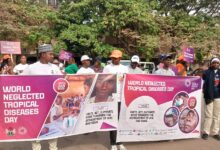Tuberculosis: Africa Records 2.5m Cases, 424,000 Deaths In 2022 -Report

Latest report from the World Health Organisation (WHO) has shown that about 2.5 million individuals in Africa contracted Tuberculosis (TB) while 424,000 died from the disease in 2022.
WHO Regional Director for Africa, Dr. Matshidiso Moeti disclosed this in her message commemorating this year’s World TB Day.
World TB Day is marked on the 24th of March every year to raise public awareness about the devastating health, social and economic consequences of TB and to step up efforts to end the global TB epidemic.
Moeti informed that tuberculosis was the second leading cause of death from a single infectious agent, surpassing the toll of HIV/AIDS.
“According to the latest report, about 2.5 million individuals contracted TB in 2022 in the region, equating to one person every 13 seconds.
“Additionally, the number of TB deaths in 2022 reached 424,000, resulting in the loss of one life every minute—even when TB is preventable and treatable. These figures underscore the urgency of our collective action in addressing the ongoing TB epidemic and highlight the need for sustained efforts to end it”, she said.
She explained that the 72nd session of the WHO Regional Committee for Africa in Lomé, Togo, in 2022 ignited a powerful movement toward ending tuberculosis, prioritising childhood TB. Ministers of Health across the region united to address the needs of this often-overlooked population.
Since then, a 20% increase had been recorded in identified paediatric TB cases compared to the previous year.
She further disclosed that the WHO African Region supports its member states’ fight against TB in Africa by setting strategic directions, developing monitoring tools, like the African TB scorecard with the African Union, and ensuring progress towards the End TB Strategy.
Also, “our Organisation is dedicated to generating and sharing knowledge on effective TB control methods. We support countries by updating TB treatment guidelines to reflect the latest practices and expanding access to rapid diagnostic tools.
“In the WHO African Region, we celebrate another milestone: diagnosing 70% of TB patients, marking a substantial reduction in missed cases and propelling us closer to our goal. This achievement is a testament to the relentless efforts of our Member States and partners, showcasing what can be accomplished through a shared vision and concerted action.
“Between 2015 and 2022, our region achieved a remarkable 38% reduction in TB deaths, surpassing the initial End TB Strategy milestone of 35% by 2020. From 2015 to 2022, the region also saw a 23% reduction in new TB cases, exceeding the initial End TB Strategy target of 20% by 2020. All this underscores the effectiveness of implemented strategies and renewed commitment from countries.
“However, while the reduction in TB deaths is commendable, it still falls short of the 2025 End TB Strategy target of a 75% reduction. Similarly, the 23% decline in TB incidence mises the mark of the 50% reduction target for 2025. This highlights the need for continued and intensified efforts to meet these ambitious goals”, Dr. Moeti said.
She however noted that challenges such as delayed diagnosis, limited access to new tools and technologies, and the ongoing threat of multi-drug resistant TB required continued vigilance and sustained efforts.
Consequently, she urged stakeholders to provide resources, enhance community engagement, conduct research, and form private-sector partnerships.
She urged WHO Africa Region Member States to “prioritise a multi-faceted approach that addresses the root causes of the disease while bolstering our efforts in prevention, diagnosis, and treatment”. In addition, she urged health leaders to intensify their commitment to strengthening health systems, ensuring equitable access to TB care, and scaling up innovative interventions.
She said, “investing in research and developing new tools, including vaccines and improved diagnostics, is essential to accelerate progress.
“Furthermore, countries must prioritize addressing the social determinants of TB, such as poverty, inequality, and limited access to healthcare, to achieve sustainable outcomes. Collaboration across sectors and borders is paramount”.






